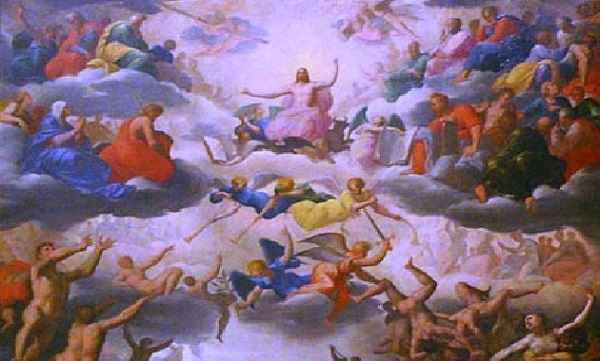How should we describe heaven and hell to children? (Maria Dimitriadou, Pedagogue)
26 Μαρτίου 2017
[Previous post: http://bit.ly/2nr6SdU]
The soul of a child should feel death as the threshold of life in heaven, a stepping-stone towards eternal life with Christ’, that is, paradise. The main role in the Orthodox spiritual development of a child is played by the family in which it grows up. The notion of Paradise, however, is of great importance for psychology, even in cases where there is no religious input. The deceased live happily in Paradise, that is a beautiful place which we can’t see, but from which they can see and hear us. Particularly in pre-school years, the presentation of life after death is not merely important but actually necessary.

Teaching children about life after death and the presentation of Paradise and Hell must be undertaken from the point of view of God’s love for us. Therefore a necessary condition is that we cultivate love for God in the souls of our children. Paradise is the incomparably happy life within the love and presence of God, whereas Hell is the absence of God and the pain we cause to ourselves by rejecting His love. It has been suggested, however, that, when children are young, it’s better for grown-ups to dwell on the good things of Paradise, the angels and the saints, rather than involve Hell and the demons. Of course, good and evil are things which children are taught from an early age so it’s important, if any discussion touches on wicked actions and the people who commit them, that the children know that Christ is always willing to forgive any sin.
Besides, it’s good if grown-ups don’t insist on absolute theological correctness in their discussions with children. Children often express mistaken theological ideas regarding life in Paradise, such as, for example, that they’ll find their favourite toys, video games, ice-cream and pets. If the answer is completely negative, there’s a danger of killing off, or at least diluting their desire for Paradise and, by extension, their love for Christ. In any case, we should be careful to get across to them the fact that Paradise is incomparably better than anything we can imagine. So, speaking theologically, we shouldn’t destroy a notion that other people hold unless we replace it with something more mature, but which doesn’t exceed the level of their understanding.
On the other hand, children sometimes say that they want to die because they love Christ so much and want to be with Him. The answer to this mustn’t be to deter them by instilling a morbid fear of death, but instead we should explain that death is, indeed, a blessing, but only when God ‘sends us the ticket’, that is, when we’re ready.
Another important condition for the successful preparation of a child for an imminent death, is instruction in prayer, a state which is best learned from experience, usually by following the example of the parents. Elder Sophrony (Sakharov) says that for children to learn to pray, they have to have the blood of praying parents, to live in an atmosphere of prayer. In this way, the child acquires the means of communication with the heavenly world and thus, later, with the person about to depart this life. The Saturdays of the Souls, the memorial services and every Divine Liturgy are a good opportunity to explain to children this communication between the Church Militant and the Church Triumphant.
In conclusion, the preparation of children regarding death can also be carried out through the approach of reading the Lives of the saints. This nourishes their souls with the values of the Orthodox faith, while at the same time, when they children are older, these Lives can serve as a spring-board for discussions about the meaning of life. In particular, the attitude of the saints to death, which they meet with courage and joy, is the best teaching regarding our union with Christ, about the message of the resurrection, eternal life and, therefore, the meaning of this present life. We may also make the point that we celebrate the date of a saint’s demise, not the date of their birth.





